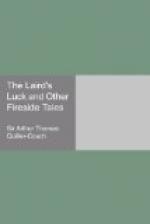“My daughter, had they caught me, they might have tortured me. I might have held my tongue: but, again, I might not. Under torture one never knows what will happen. But the secret of the liquor had to die with me—that is in the vow. So to be on the safe side I made—other things.”
“Father, give me to drink of those other things.”
She spoke scarcely above her breath: but her fingers were gripping his arm. He looked straight into her eyes.
“My poor child!” was all he said, very low and slow.
“I can touch no other sacrament,” she pleaded. “Father, have mercy and give me that one!” She watched his eyes eagerly as they flinched from hers in pity and dwelt for a moment on a tall chest behind her shoulder, against the wall to the right of the door. She glanced round, stepped to the chest, and laid a hand on the lid. “Is it here?” she asked.
But he was beside her on the instant; and stooping, locked down the lid, and drew out the key abruptly.
“Is it here?” she repeated.
“My child, that is an ice-chest. In the liquor, for perfection, the water used has first to be frozen. That chest contains ice, and nothing else.”
“Nothing else?” she persisted.
But here Felipe broke in. “The Senorita is off her hinges, father. Much fasting has made her light-headed. And that brings me to my business. You know my head, too, is not strong: good enough for a furlong or two, but not for the mile course. Now if you will shelter these two innocents whilst I forage we shall make a famous household. You have rooms here in plenty; the best-hidden in Panama. But none of us can live without food, and with these two to look after I am hampered. There are the dogs, too. But Felipe knows a trick or two more than the dogs, and if he do not fill your larder by sunset, may his left leg be withered like his right!”
Brother Bartolome considered. “Here are the keys,” said he. “Choose your lodgings and take the boy along with you, for I think the sister here wishes to talk with me alone.”
Felipe took the keys and handed me the small lamp, which I held aloft as he limped after me along the dark corridor, tapping its flagged pavement with the nail of his crutch. We passed an iron-studded door which led, he told me, to the crypt of the chapel; and soon after mounted a flight of steps and found ourselves before the great folding doors of the ante-chapel itself, and looked in. Here was daylight again: actual sunlight, falling through six windows high up in the southern wall and resting in bright patches on the stall canopies within. We looked on these bright patches through the interspaces of a great carved screen: but when I would have pressed into the chapel for a better view, Felipe took me by the collar.
“Business first,” said he, and pointed up the staircase, which mounted steeply again after its break by the chapel doors. Up we went, and were saluted again by the smell of burnt cedar-wood wafted through lancet windows, barred but unglazed, in the outer wall. The inner wall was blank, of course, being the northern side-wall of the chapel: but we passed one doorway in it with which I was to make better acquaintance. And, about twenty steps higher, we reached a long level corridor and the cells where the brothers slept.




